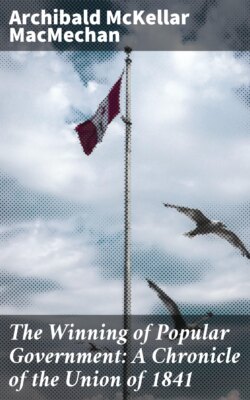The Winning of Popular Government: A Chronicle of the Union of 1841

Реклама. ООО «ЛитРес», ИНН: 7719571260.
Оглавление
Archibald McKellar MacMechan. The Winning of Popular Government: A Chronicle of the Union of 1841
The Winning of Popular Government: A Chronicle of the Union of 1841
Table of Contents
CHAPTER I
DURHAM THE DICTATOR
CHAPTER II
POULETT THOMSON, PEACEMAKER
CHAPTER III
REFORM IN THE SADDLE
CHAPTER IV
THE GREAT ADMINISTRATION
CHAPTER V
THE PRINCIPLE ESTABLISHED
EPILOGUE
BIBLIOGRAPHICAL NOTE
Footnote
INDEX
Отрывок из книги
Archibald McKellar MacMechan
Published by Good Press, 2021
.....
Durham took prompt action. He offered a reward of a thousand pounds for such information as should bring the guilty persons to trial in an American, not a Canadian, court. Thereby he said in effect, 'This is not an international affair. It is a plain offence against the laws of the United States, and I am confident that the United States desires to prevent such outrages.' He followed up this bold declaration of faith in American justice by sending his brother-in-law, Colonel Grey of the 71st Regiment, to Washington to lay the facts before President Van Buren and to remonstrate vigorously against the laxity which permitted an armed force to organize within the borders of the Republic for an attack upon its peaceful neighbour. Such laxity was against the law of nations. As a result of Durham's spirited action, the military forces on both sides of the boundary-line worked in concert to put down such lawlessness. President Van Buren's attitude, however, cost him his popularity in his own country.
The most pressing and most thorny question was how to deal with the hundreds of prisoners who, since the rebellion, had filled the Canadian jails. A large number of these were only suspected of treason; some had been taken in the act of rebellion; and some were confined as ringleaders, charged with crimes no government could overlook and hope to survive. In some countries the solution would have been a simple one: the prisoners would have been backed against the nearest wall and fusilladed in batches, as the Communists were dealt with in Paris in the red quarter of the year 1871. Even in Canada there were hideous cries for bloody reprisals. But the ingrained British habit of giving the worst criminal a fair trial blocked such a ready and easy way of restoring tranquillity. Still, a fair trial was impossible. In the temper then prevailing in the province no French jury would condemn, no English jury would acquit, a Frenchman charged with treason, however great or slight his fault might prove to be. The process of trying so many hundreds of prisoners would be simply so many examples of the law's burdensome delay. To leave them to rot in prison, as King Bomba left political offenders against his rule, was unthinkable. Durham met the difficulty in a bold and merciful way. The young Queen was crowned on June 28, 1838. Such an event is always a season of rejoicing and an opportunity for exercising the royal clemency in the liberation of captives. Following this excellent custom, Durham proclaimed on that day an amnesty in his sovereign's name; and, in a month after his arrival, he gave freedom to hundreds of unfortunates, who had endured many hardships in the old, cruel jails of the time, in addition to the tortures of suspense as to their ultimate fate.
.....